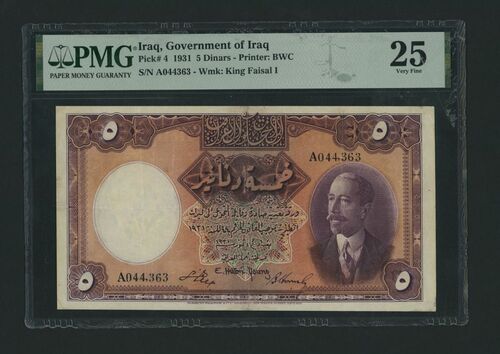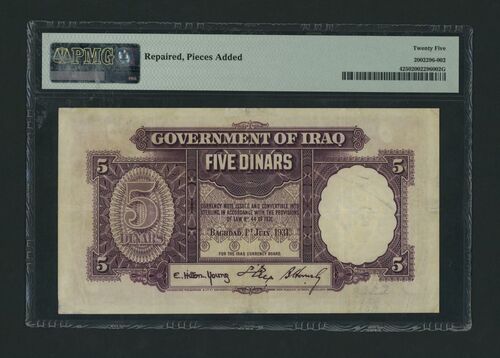Auction: 23231 - World Banknotes - e-Auction
Lot: 499
(x) Government of Iraq, [Top Pop] 5 Dinars, Baghdad, 1st July 1931, serial number A044363, King Faisal I, born 20th May 1883 in Ta'if, Saudi Arabia, played a pivotal role in the turbulent landscape of the post-World War I Middle East. The third son of Sharif Hussein bin Ali, he actively participated in the Arab Revolt against the Ottoman Empire and collaborated closely with T.E. Lawrence.
Following the war, Faisal found himself in a position of diplomatic importance, as The League of Nations entrusted him with the governance of the newly established Arab state of Syria. However, due to French interference this period proved short-lived. In 1920, Faisal was expelled from Syria, marking a turning point in his journey.
Undeterred by this setback, Faisal's destiny took a transformative turn. With British support in 1921, Faisal was crowned as the first monarch of Iraq. This move marked the beginning of a new era for the region.
His rule in Iraq was characterised by a profound commitment to modernisation and nation-building. Faisal I implemented sweeping reforms, particularly in education, infrastructure, and administration. Faisal worked to forge a cohesive national identity in a country marked by diverse ethnic and religious groups.
King Faisal I's era in Iraq also witnessed significant developments in the banking system. Recognising the importance of a robust financial infrastructure, his administration initiated reforms aimed at creating a more efficient and stable banking sector. New banknotes were issued as part of these reforms, featuring designs reflecting Iraq cultural and historical identity.
One of those banknotes was this rare 5 Dinar note, printed in Baghdad on the 1st of July 1931, with the serial number A044363. It stands out as being Top Pop of a population of only 9 notes graded by PMG thus far. This note's issue represented not only a practical step in modernising the financial system but also symbolised the sovereignty and stability of the nation.
Beyond being a ruler, Faisal I was an architect of modernisation, leaving an indelible mark on Iraq. His vision and efforts laid the groundwork for a unified and stable nation. Despite his untimely death on September 8, 1933, Faisal's impact persisted through the institutions he established and the ideals he championed.
King Faisal I's journey from the Arab Revolt, to the governance of Syria, and to becoming the first monarch of Iraq reflects resilience, diplomacy, and a deep commitment to shaping the region's destiny during a critical period of transition. His legacy remains a symbol of Iraq's early steps towards unity, progress, and financial modernisation
(Pick 4, BNB 104), in PMG holder 25 Very Fine, repaired, pieces added
Subject to 5% tax on Hammer Price in addition to 20% VAT on Buyer’s Premium.
Sold for
£15,000
Starting price
£14000







